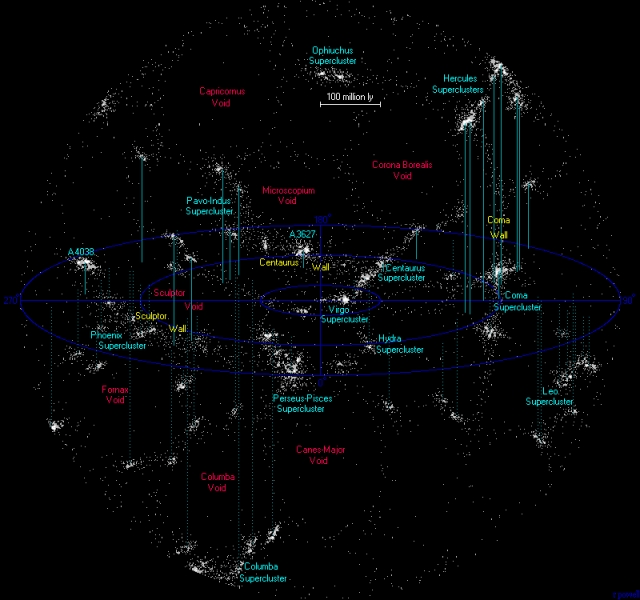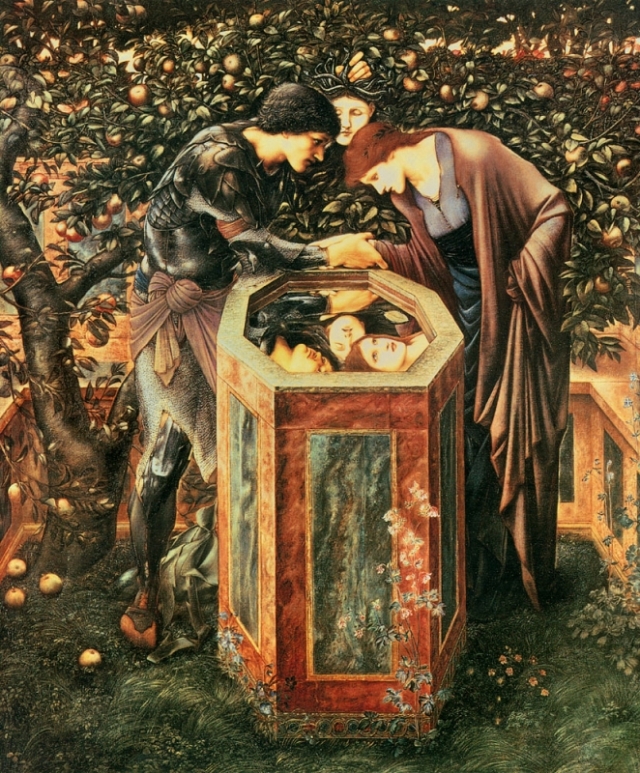Romantics like to point out that we are star stuff. The universe is mostly hydrogen and helium, and all the heavier atoms that make up things like planets and people came from the nuclear furnaces of collapsing stars. The carbon in my body, the oxygen I breathe, and the nitrogen in my food were all forged in a star that died before our solar system was born. It’s a pretty idea.
The universe is only 13 billion years old or so, and our solar system is already some 5 billion years old, so this earlier star must have been among the first in the universe. We and our solar system followed not too long afterwards. In astronomical time, the first appearance of life in the universe was probably not all that long ago.
Stars and galaxies did not always exist; they had to coalesce out of an opaque fog that once permeated everywhere. As temperatures from the Big Bang cooled and gravity continued its slow work, the stars inevitably followed. We live in an age of stars, an age that will one day end, to be replaced with something else.
The universe has been inexorably driving towards that something else ever since the very beginning. When we look around, we see that the stars have collected into galaxies, galaxies into groups, groups into clusters, and clusters into superclusters. There are more galaxies in the universe than there are stars in the sky (loosely speaking). Surveys of the superclusters are revealing that there is an elusive pattern to their arrangement; sheets of galaxies enclose vast empty gaps, like bubbles of foam. This is a structure that is still evolving, a pattern that is still playing out.
In our own tiny corner of the universe, the Milky Way galaxy and the Andromeda Galaxy, along with scores of little galaxies that orbit them, form the Local Group, which is part of the Virgo Supercluster. It was Edwin Hubble who first determined that Andromeda was, in fact, a separate galaxy. Hubble went on to discover that all galaxies are moving away from us, and doing so at a speed proportional to their distance. (Work through that sentence in your head long enough, and you’ll realize it means that the universe is expanding.)
They are all moving away from us with one exception—Andromeda herself is heading towards us, and relative to the intergalactic gas that separates us, she is heading towards us at an off-the-charts hypersonic velocity. The Milky Way and Andromeda are actually a binary system and have been orbiting one another since more-or-less the beginning of time. Soon—astronomically speaking—this system will collapse, and our two galaxies will collide.
Now, the original Andromeda was the wife of Perseus, the first of ancient Greece’s mythical heroes. Perseus had just decapitated the gorgon Medusa, and he was flying home by means of winged sandals that (evidently) propelled him at some off-the-charts hypersonic velocity. Crossing from the Atlantic Ocean to Ethiopia in just a sentence or two, Perseus beheld the lovely virgin Andromeda chained to a rock on the shores of the Red Sea, about to be devoured by an approaching sea monster.
Captivated by the attraction of Andromeda, Perseus swung back and circled over her head just long enough to learn her story…
from The Age of Fable (Bulfinch’s Mythology)
by Thomas Bulfinch, 1913Cepheus was king. Cassiopeia his queen, proud of her beauty, had dared to compare herself to the Sea-Nymphs, which roused their indignation to such a degree that they sent a prodigious sea-monster to ravage the coast. To appease the deities, Cepheus was directed by the oracle to expose his daughter Andromeda to be devoured by the monster…
With the blessings of Cepheus and Cassiopeia, Perseus flew to the rescue, destroyed the sea-monster, and won the right to marry Andromeda.
Ah, but not so fast. It turned out Andromeda had a previous suitor, Phineus. Phineus challenged Perseus’ claim to Andromeda, and attacked in force during the banquet. Perseus still had Medusa’s head at his side. The gorgon had been so hideous that, even decapitated, her gaze would turn men to stone. Perseus petrified his attackers, cruely commenting that he would keep Phineus as a statue. Equilibrium at last achieved, Perseus and Andromeda joined in holy union, never to part again. Their offspring would include Heracles, the kings of Mycenae, and all the Persians.
Are people star stuff? Computer simulations show that Andromeda and the Milky Way will one day become one galaxy. But this will not be until after a cataclysmic first meeting, followed by some tumultuous settling down. Was it not much the same for Andromeda and Perseus? Is there any difference between the people and the stars?
The collision with Andromeda, when it occurs, will be an event of incredible energy and change. The Milky Way as we know it will be destroyed, yet amidst this incredible destruction, life itself will remain perfectly safe. Galaxies are so vacuous and diffuse that the odds of stars or planets colliding is vanishingly small. Life in our solar system—whatever such life looks like 3 billion years from know—will continue undisturbed, even as the very galaxies around it are wholly reformed. Blow it all up if you have to, we will travel safe through the chaos.
This notion of safely coming through the danger is reflected in Andromeda and Perseus’ story. Andromeda going untouched by the sea monster has already been described. But Perseus has an interesting story in his own past. Like Andromeda, Perseus was sacrificed to the sea by a parent; his grandfather Acrisius, fearing an oracle, shut up an infant Perseus and his mother Danaë in a box and threw them into the ocean. Tossed on an angry, stormy sea, the terrified mother wept and prayed, and marveled as her baby slept…
The Lamentation of Danaë
by Simonides of Ceos, 6th century BCWhen round the well-fram’d ark the blowing blast
Roar’d, and the heaving whirlpools of the deep
With rough’ning surge seem’d threatening to o’er-turn
The wide-tost vessel, not with tearless cheeks
The mother round her infant gently twined
Her tender arm, and cried, “Ah me! my child!
What sufferings I endure! thou sleep’st the while,
Inhaling in thy milky-breathing breast
The balm of slumber; though imprison’d here
In undelightful dwelling; brassy-wedged;
Alone illumined by the stars of night,
And black and dark within. Thou heedest not
The wave that leaps above thee, while its spray
Wets not the locks deep-clust’ring round thy head;
Nor hears’t the shrill winds’ hollow-whisp’ring sounds,
While on thy purple downy mantle stretch’d,
With count’nance flush’d in sleeping loveliness.
Then, if this dreadful peril would to thee
Be dreadful, turn a light unconscious ear
To my lamentings: sleep! I bid the sleep,
My infant! oh, may the tremendous surge
Sleep also! may th’ immeasurable scene
Of watery perils sleep, and be at rest!
And void, and frustrate, prove this dark device,
I do conjure thee, Jove! and, though my words
May rise to boldness, at thy hands I ask
A righteous vengeance, by this infant’s aid!
The young Perseus had the right idea. In the face of a danger so far beyond what one might hope to control, there is nothing to do but ride it out. Often, such dangers turn out to be “full of sound and fury, signifying nothing.”
And in the rare case when they aren’t—well, you won’t feel a thing either way…


Another execellent article and writing from the professor. Why don’t you start your own business or become a college professor, “Professor”…
I didn’t see Heaven or Hell in the oval cosmos but is it humorus that it appears oval mmmm I wonder is it shaping into some 4 dimensional form.
This is an excellent article… i am a new student at a community college but i am interested in this sorta stuff. You did a great job and definately should be a proffessor somewhere(how about my school)!!!
Tupac,
Thank you very much, and welcome back from the dead! I was pretty happy with this one too– it’s nice when the ideas line up.
Personally, I ended up spending a lot of years in college, and like you, I started at a community college. I’d encourage you to study as widely as you can, especially from the humanities and the hard sciences. (The social sciences are very overrated, in my opinion.) Be curious, work hard, and don’t cheat, and you’ll get a lot out of it. Good luck!